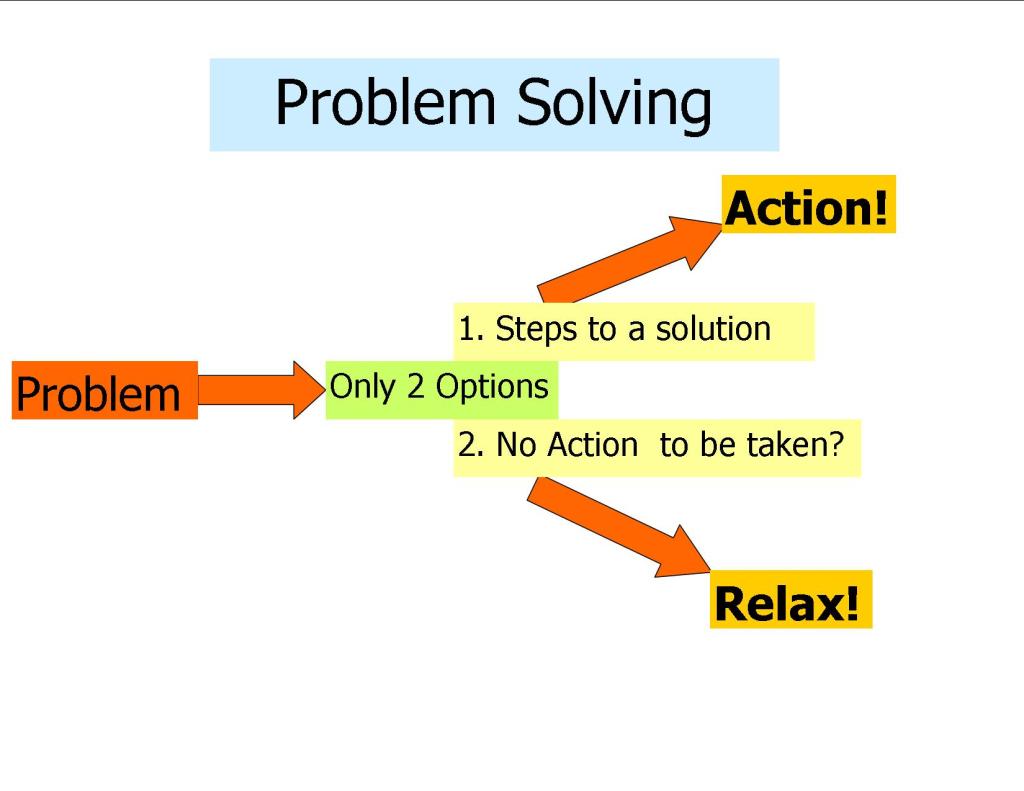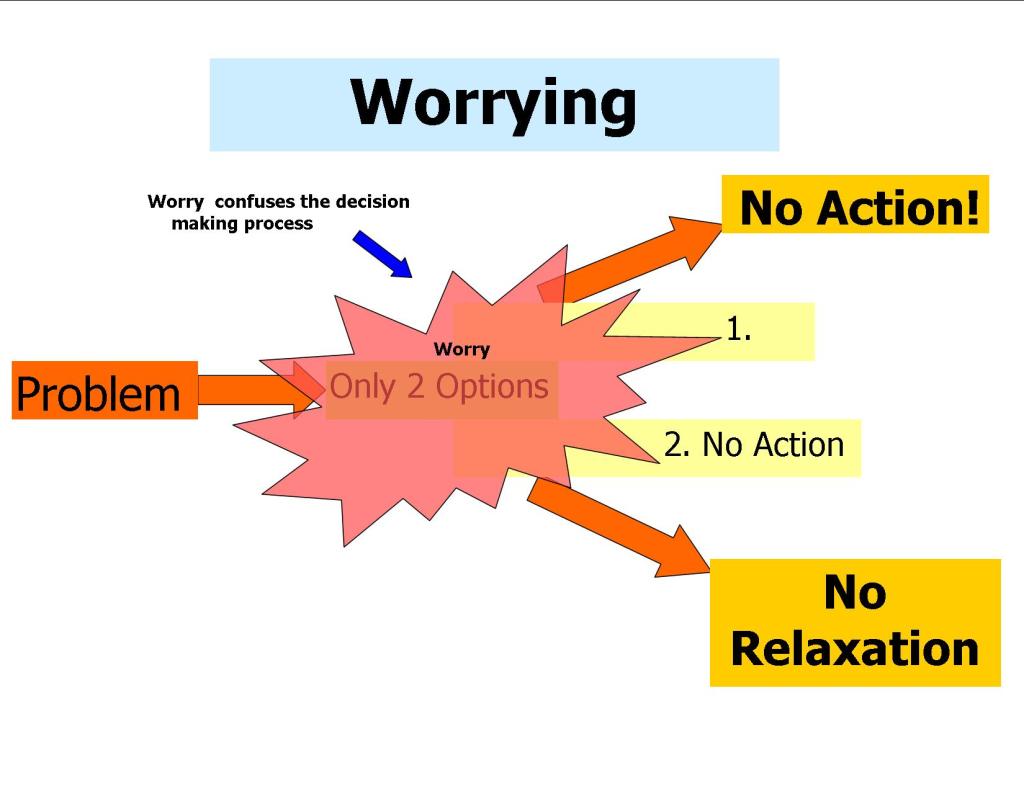3 Ways to Stop Worry
Two Info-graphics on worry and enlightenment, to show how we can solve our problems. The first graphic. In the second info-graphic what happens when we worry, what is the outcome then.
Worry and Enlightenment: When we worry it clouds all our thinking so that we neither take action to change the situation nor do we relax.
Worry and Enlightenment
Today we’re going to be looking at worry and asking the question what is worry? How does worry serve me? What does worry cause? And finally, how do I eliminate worry from my life? Is it even possible to eliminate worry from my life.
Let me start off by telling you worry is a learned habit that is quietly disastrous for our life as a whole. It affects every area of our life when we develop the habit of worrying. So the question is how could I develop this habit? So I’ll give you a small story to help you to understand. Many children as you probably know don’t worry, their life is free and their fun and they are having their life incidences, they are living a beautiful, great life and worry free.
So let’s imagine now you’ve lived a life worry free, its now time to go to university, but you don’t have the money to go to university, and so you start thinking “where’s the money going to come from.”
“Where’s that money going to come from, where’s the money going to come from…” As we repeat that to ourselves three or four times it starts establishing a pattern in our consciousness, starts establishing a grove, the more we think it the more it sounds like a broken record.
“Where’s the money going to come from, where’s that money going to come from, where’s the money going to come from,”
It’s like life is an old grammar phone record. We pull the record off the shelf, we look at the title which says “The symphony of my life” and we put the needle on, and the song plays. All through our younger years the music is being played as life happens with our families, the joys, the incidents, we fall and hurt ourselves we get up back again, we burn our fingers, we heal them, we play with our friends, we fall out with our friends. Life is this flow of incidents, up and down, up ad down like a symphony, beautiful music playing. Then we come to this stage in life and all of a sudden we start asking “Where’s the money going to come from, where’s that money going to come from,” and so it’s like the needle gets struck on the record. We are and stuck in repetitive thinking that literally stops us. That’s what worry does. It stops us in our tracks and we’re unable to move forward.
So since we start worrying thinking “Where’s the money gonna come from” then we become preoccupied with those thoughts. Now that our thoughts are focused and preoccupied, we don’t really have time to call our friends, nor do we have the information to call our friends so we stay at home and we think about it some more “Where’s the money gonna come from’” Next, we are tired and we’re actually not feeling so good so we call our part-time job and say “Well I’m actually not feeling so good today I’m not going to come in.”
Pretty soon we find that we’re staying home more and more and communicating less and less while we’re preoccupied with the worry of “Where’s the money gonna come from.” It is as though the needle on the record has got stuck and we’ve fallen into a canyon. The more the needle stays in the same rut the deeper the canyon gets. Eventually we reach the very bottom of this canyon, and it feels like the very base of the Grand Canyon and the walls look insurmountable. Life looks like it’s impossible. We don’t have the energy to get out of bed. We’re now in severe depression. Contacting our friends who would want to speak to us is impossible. Why bother going to part-time job when holding such low self worth. All our self judgments come roaring into focus. Here we are lying in bed feeling as though we’re at the bottom of the deepest pit imaginable.
But then what happens is that we get a call from an aunt in Florida who says “I’m happy to help you with the money to go to university so here hunny ill lend you the money.”
So all of a sudden the needle pops out of the Grand Canyon back onto the record, the depression drops, and off we go to university. And here we are now at school and we’re learning and life is progressing but now we’ve learnt the habit, and we become addicted to this habit. Guess what the next thing is you’re going to worry about? How are my grades? Then when I get reasonable grades, will I finish school?
So life flows forward and we constantly look forward to the next thing to worry about. And when we find something to worry about and we don’t take action we fall into depression yet again and again. Each time we get lost in preoccupation, introversion and literally we’re back at the bottom of the Grand Canyon.
This is how life is for millions and millions of people. They’ve learnt the habit of worrying. Many people secretly enjoy the habit of worrying, as it gives them a feeling of doing something. Even if they think they don’t enjoy the habit they keep moving forward and forward in the lines. After university the worry habit moves forward. Will I get a job? The next worry that comes along is: Will I get a boyfriend, girlfriend?
Then comes, will I get married, then, will I have kids, then, can I save up for retirement, then eventually we find ourselves in retirement still worried.
With this pattern of Worry and enlightenment will be impossible
This is a really lovely story I would like to share with you about a lady who’s in her 80s and she’s worried about the money that she has to live on for the rest of her life.
She is constantly complaining and worried about it. Her worry has aged her. Her face looks drawn out and she looks really sad constantly.
Her son says, “Ok, let me sort this out once and for all, because I don’t think her fears are really founded.” He goes and he finds out the value of her bank account and the value her house and all her monthly expenses. He created a huge spreadsheet with all the relevant information on it. He comes to his mom and says “Mom I’ve got great news for you, you’ve got enough money to live on until you’re a 106.”
Now if I was to tell you that you had enough money to live on till you a 106 you’d probably stop immediately and go out and celebrate, in what ever way you want to.
But that’s not what a worrier does. What a worrier does is immediately start scanning ahead for the next thing to worry about. In this case the immediate response of this lady is, “But what happens when I’m a 107.”
As you can see from all these examples worry is a learnt habit that we keep on projecting forward into the future, and inventing things to worry about.
Now let’s look more closely at the effects of worry on our lives. Let’s take an example of the money to go to university, as we’ve already used that one. What options did that person have?
Option 1 is to act. Although there may be no money currently they can begin by writing a list of persons they can ask. They send out the requests, they can get in action seeking the money.
Now if there’s no action to be taken, for instance we know nobody with money. What is the other response? This is very likely to surprise 99% of humanity.
If there is no action to be taken we can relax.
Instead what do most people do? Instead of relaxing we worry. We cloud up the whole area we don’t relax nor do we take action.
We get sucked into a pattern of worrying. It keeps us going round and round and round in the same spot, preoccupied, introverted, not taking action, procrastinating.
Let’s look at it from another perspective. Having taught many university students about meditation one of the questions that I enjoy asking the class is “How many of your parents worry about you?”
Typically in a class of students it will be 70% of the class will say their parents worry about them. My next questions ask if they think their parents are likely to worry about you for the rest of your life? Again 50-60% of those students will say yes.
These students their highly intelligent, they are financially secure, they’re likely to live a very beautiful life independent of their parents. Yet their parents are going to worry about them even in older age, despite having no influence on their actions. They are worrying about something they have no action to be taken.
The average age of the parents is 50, and they have a life expectancy of 85. Those parents have 35 years of worry ahead of them.
Oops, I made an error, except that, because of the worrying, that will knock their life expectancy down to 25 because they’ll die early from all the worry.
If instead they were to learn to drop the worry and enjoy the development of their children as they become older and more mature, age 30 and 40.
They can enjoy as their children go on to have families, and get to work and have adventures in life.
They could live those 30 years in joy, happiness and love. Because of their shift in attitude they will probably live 10 years longer.
In summary, the life expectancy between a non-worrier and a worrier is about 10 years. Please reflect on the costs of those 30 years of worry. People are subjecting themselves to that which has no basis at all in reality. It is quiet a horrendous and debilitating condition. We can work at to shift as much as possible.
So how do we shift from worrying?
Step number one is recognizing the debilitating effect it has on us. Once they cause our energetic system to be weakened. They cause us to get stomach ulcers. They cause us to get all sort of different ailments; high blood pressure, heart attack, stroke. All these illnesses are cause by anxiety and worry. When we fully grasp the impact on our lives of worry we may be more inclined to take some action right away.
The next step is to look at the benefits of worry. What do we get out of worrying? When we look at this closely we find that we get attention from other people which is highly attractive. As soon as we start talking about our worries, people will come around to listen, we draw in a crowd, and we get our attention. This may be negative attention, but attention nevertheless. When we discover the benefits we get from worry we are much more likely to shift and drop worry.
The second benefit of worry is that we get to procrastinate. There is a joy. (Believe it or not) in procrastinating, it keeps us from having to take action. It keeps us dark by thinking negative thoughts. It keeps us reviewing options “What if this? What if that?” The mind loves to examine, loves to review, and loves to cogitate on our words.
How to stop worrying?
- The meditation suggested in the video below is a powerful meditation to stop worrying.
- Write a list of the benefits of worry that you yourself get out of worrying.
- Review the list and share the list with a close friend
- When a worry comes up share that with the friend and talk about the benefits and costs
- Ideally plan to laugh at the worry
- Having laughed at the worry, now look at can you either take action, or relax?
- Which one can you do now?
- Send me a note and I will send you a free book on how to Stop Worrying. Send to Dheera.la@gmail.com
This is a video that explains more about worry and enlightenment. The third step is to watch this video.
If you enjoy this and want to move your worry patterns away rapidly I recommend that you plan on taking spiritual life coaching from me. You can find a link Here
How Life Coaching breaks the cycle of Worry












